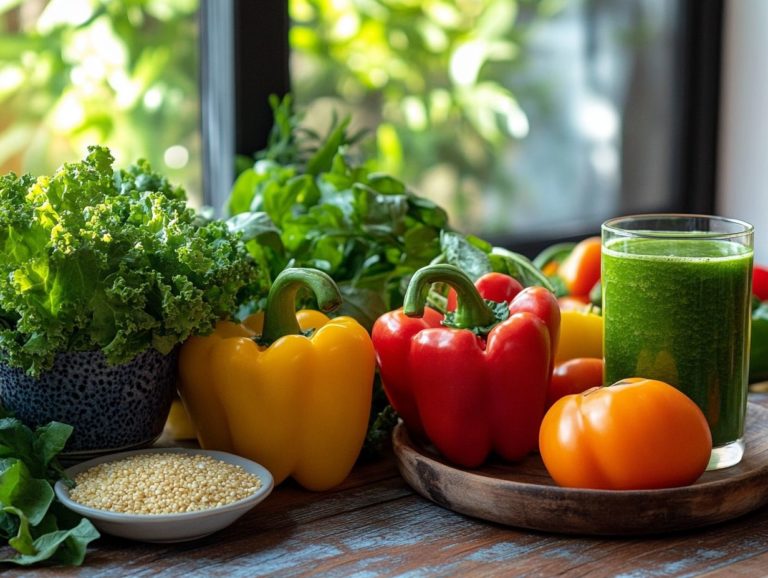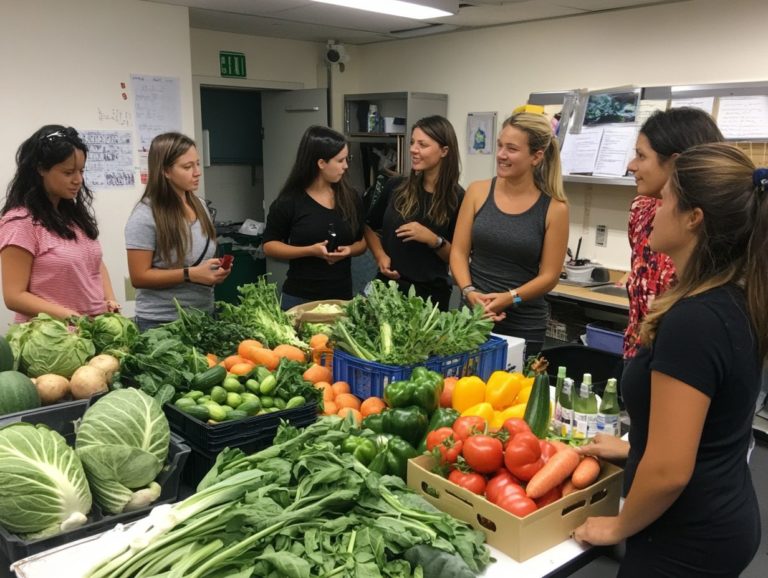How to Use Seasonal Foods in Your Diet?
Eating seasonally transcends being merely a culinary trend; it s a refined lifestyle choice that offers a wealth of nutritional and environmental benefits.
By embracing seasonal foods in your diet, you not only savor fresher, more flavorful produce but also champion local farmers and minimize your carbon footprint.
Explore practical shopping and meal planning strategies, uncover the finest seasonal ingredients for each time of year, and discover inventive recipes to fully utilize nature s bounty.
Start your seasonal eating journey today and experience the amazing flavors waiting for you!
Contents
- Key Takeaways:
- Benefits of Eating Seasonally
- How to Incorporate Seasonal Foods into Your Diet
- Best Seasonal Foods for Each Season
- Creative Ways to Use Seasonal Produce
- Frequently Asked Questions
- What are seasonal foods, and why should I incorporate them into my diet?
- How do I know which foods are in season?
- Can I still eat my favorite foods if they are not in season?
- How can I incorporate seasonal foods into my diet?
- Are there any health benefits to consuming seasonal foods?
- Delicious Seasonal Treats to Savor Year-Round!
Key Takeaways:
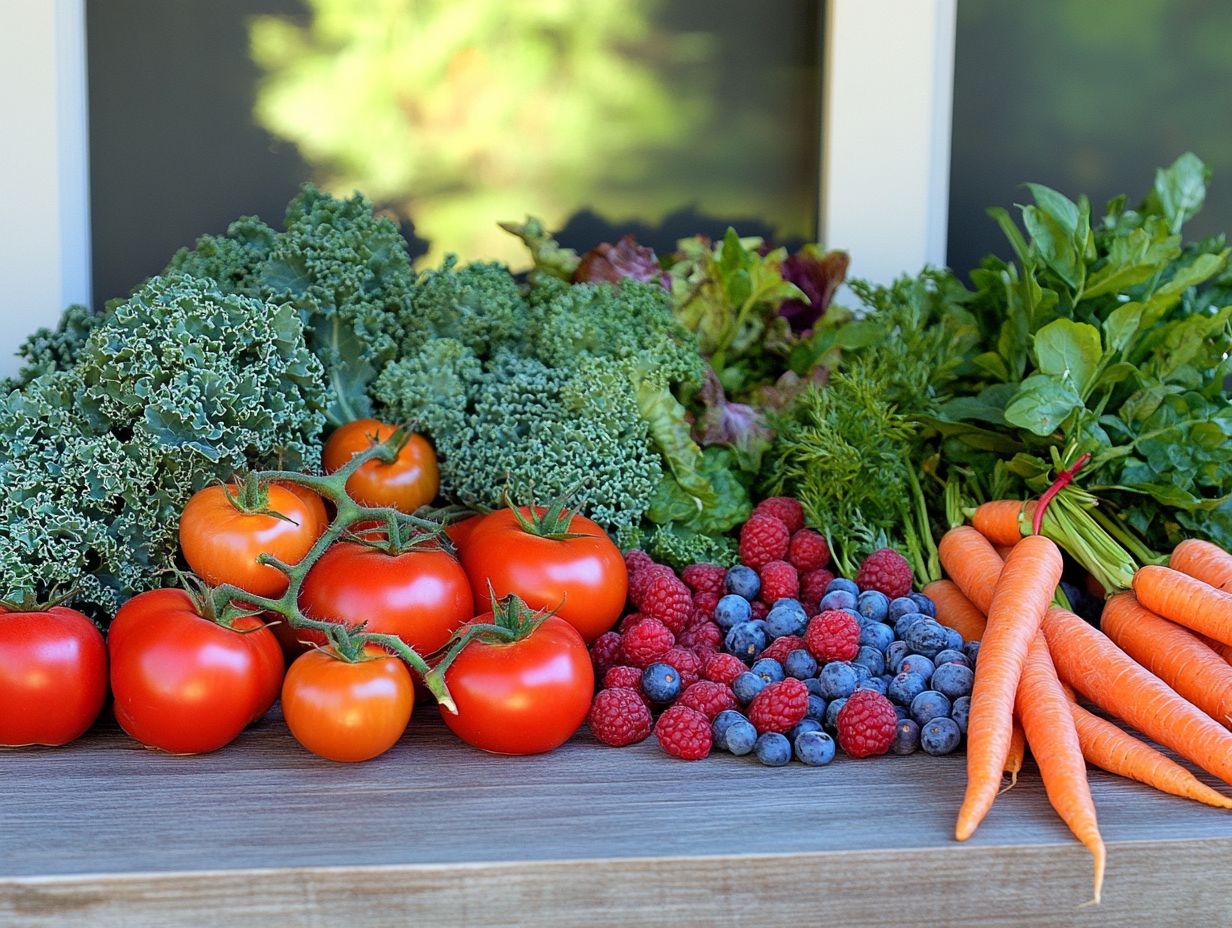
- Eating seasonally can provide both nutritional and environmental benefits, such as fresher and more nutritious produce and reduced carbon footprint.
- To incorporate seasonal foods into your diet, try shopping at local farmers’ markets and planning meals around what’s in season.
- Take advantage of the delicious and diverse options of seasonal produce each season by trying out new recipes and incorporating them into your meals.
Benefits of Eating Seasonally
Choosing what s in season makes your meals tastier and helps the planet! Embracing seasonal eating offers a multitude of advantages that positively influence both personal well-being and the environment.
By indulging in seasonal fruits and vegetables at their peak freshness, you guarantee optimal nutrient content.
Supporting local farmers and local farm programs cultivates a sustainable lifestyle that reduces food waste and champions responsible sourcing.
By synchronizing your eating habits with natural growing cycles, you savor exquisite flavors while making informed decisions that enhance your health and nurture the planet.
Nutritional and Environmental Advantages
The nutritional and environmental benefits of seasonal eating are truly remarkable. By consuming food at its peak freshness, you enhance its nutrient content, packed with polyphenols and essential vitamins.
When you align your meals with the natural growing cycles, you maximize your intake of vital nutrients while supporting local agriculture and minimizing the carbon footprint tied to transportation.
Seasonal foods are often harvested at their prime, meaning you enjoy optimal flavor and nutrient levels translating directly into better health benefits. Additionally, you can utilize various food preservation methods like canning, freezing, and fermenting to savor these seasonal advantages all year round.
This allows you to embrace the rich flavors and nutrients of produce even during off-seasons, promoting a diverse diet and deepening your connection to the earth s rhythms.
How to Incorporate Seasonal Foods into Your Diet
Incorporating seasonal foods into your diet demands thoughtful planning and a flair for creative cooking. This enables you to make the most of the fresh produce available at farmers markets and through local farm programs.
By grasping the nuances of seasonal availability and employing a produce calendar, you can unlock a treasure trove of unique flavors that seamlessly align with your culinary preferences.
Shopping and Meal Planning Tips

Effective shopping and meal planning strategies can significantly enhance your experience with seasonal eating, giving you the power to make informed choices at the farmers market while minimizing food waste.
By understanding which produce is in season, you can relish fresher ingredients and support local farmers, ultimately boosting your community. It s wise to come equipped with a seasonal food guide that outlines which fruits and vegetables are ripe for the picking each month.
This preparation can streamline your shopping experience and facilitate efficient meal planning. Incorporating these seasonal delights into your recipes not only elevates flavor but also transforms family meals into vibrant occasions brimming with colors and nutrients.
A simple weekly plan can help you avoid impulse buys, ensuring that everything you purchase gets utilized, thereby reducing the temptation of last-minute takeout.
Best Seasonal Foods for Each Season
Understanding the best seasonal foods requires recognizing the natural times when fruits and vegetables grow. This awareness enables you to enjoy a diverse and nutrient-rich diet all year round.
By choosing seasonal produce, you support local agriculture and enhance the flavors and nutritional value of your meals.
Top Picks for Spring, Summer, Fall, and Winter
Each season presents a delightful selection of fruits and vegetables that are not only delicious but also brimming with nutrients. Consulting a seasonal food guide can help you identify your top picks.
These carefully chosen options bring vibrant flavors and unique health benefits to elevate your everyday meals. For instance, spring welcomes tender asparagus and sweet strawberries, both rich in vitamins and antioxidants that support overall wellness.
When summer arrives, juicy tomatoes and refreshing cucumbers not only add color to your salads but also offer hydration and essential nutrients.
As fall approaches, hearty squash and crisp apples provide fiber and vitamins that can help boost your immune system.
Winter showcases root vegetables like carrots and beets, packed with minerals and perfect for adding depth to your comforting dishes.
By embracing these seasonal offerings, you enhance your culinary experience and promote a vibrant, healthy lifestyle.
Creative Ways to Use Seasonal Produce
Discovering innovative ways to incorporate seasonal produce can revolutionize your meals and enhance your culinary journey. This approach invites you to explore a tapestry of vibrant seasonal recipes while helping you reduce food waste significantly.
Recipes and Meal Ideas
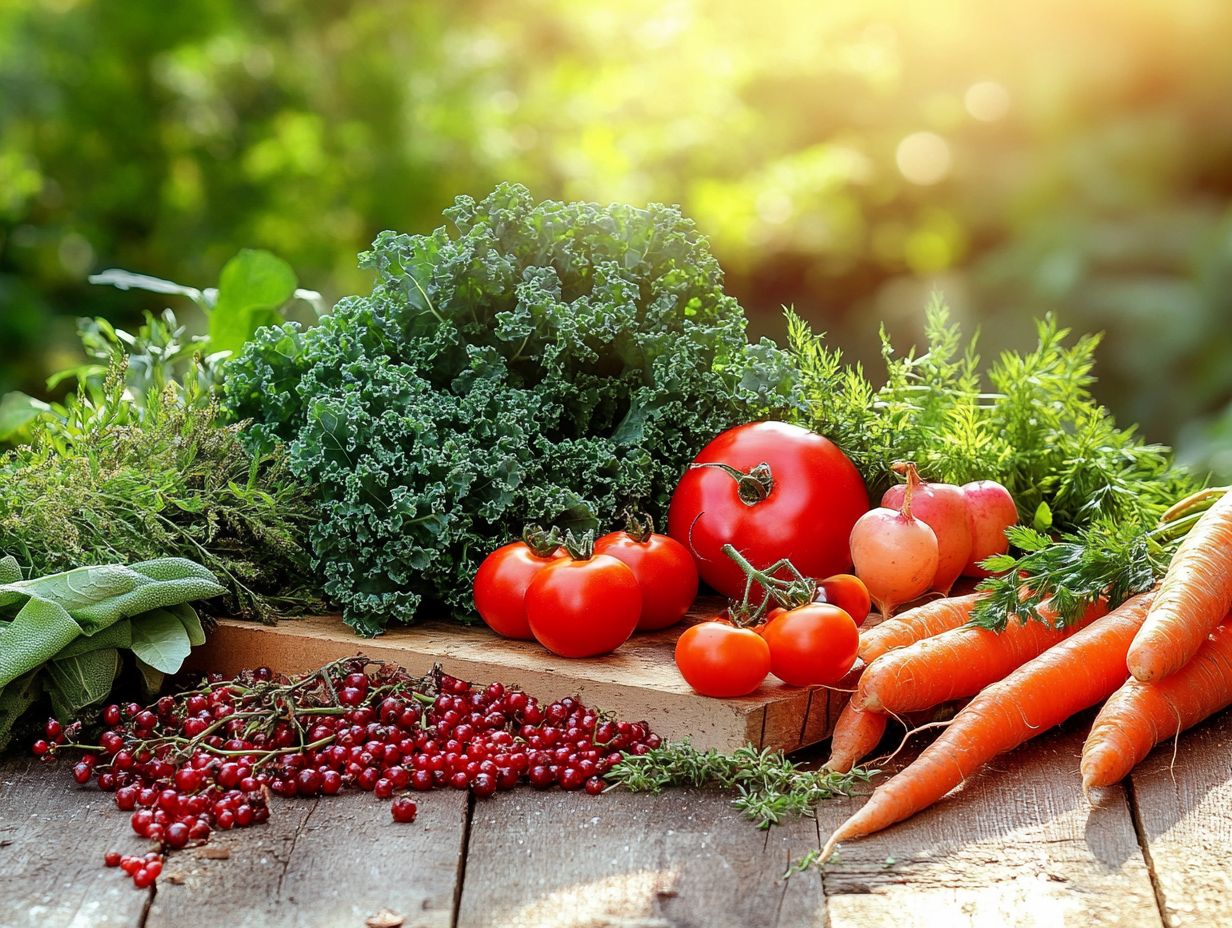
Exploring seasonal recipes allows you to showcase unique flavors while embracing healthy cooking practices. By focusing on what’s fresh in your area, you indulge in dishes brimming with nutrients and support local farmers.
For instance, when you add kale and butternut squash into hearty salads or soups, you nourish your body and find delicious ways to warm up on cooler days. When it comes to desserts, experimenting with berries and stone fruits accentuates their natural sweetness and provides an antioxidant boost your body will thank you for.
Visiting local farmers’ markets transforms your meal planning, connecting you with those who cultivate the land. This ensures your sourcing is both responsible and sustainable, making each meal a celebration of community and health.
Frequently Asked Questions
What are seasonal foods, and why should I incorporate them into my diet?
Seasonal foods are fruits and vegetables that are grown and harvested during specific times of the year. They are fresh, flavorful, and packed with nutrients. Incorporating them into your diet helps you enjoy a variety of nutrients and supports local agriculture.
How do I know which foods are in season?
You can find out which foods are in season by visiting your local farmers’ market or checking online resources. Look for signs in grocery stores that indicate which foods are locally grown and in season.
Can I still eat my favorite foods if they are not in season?
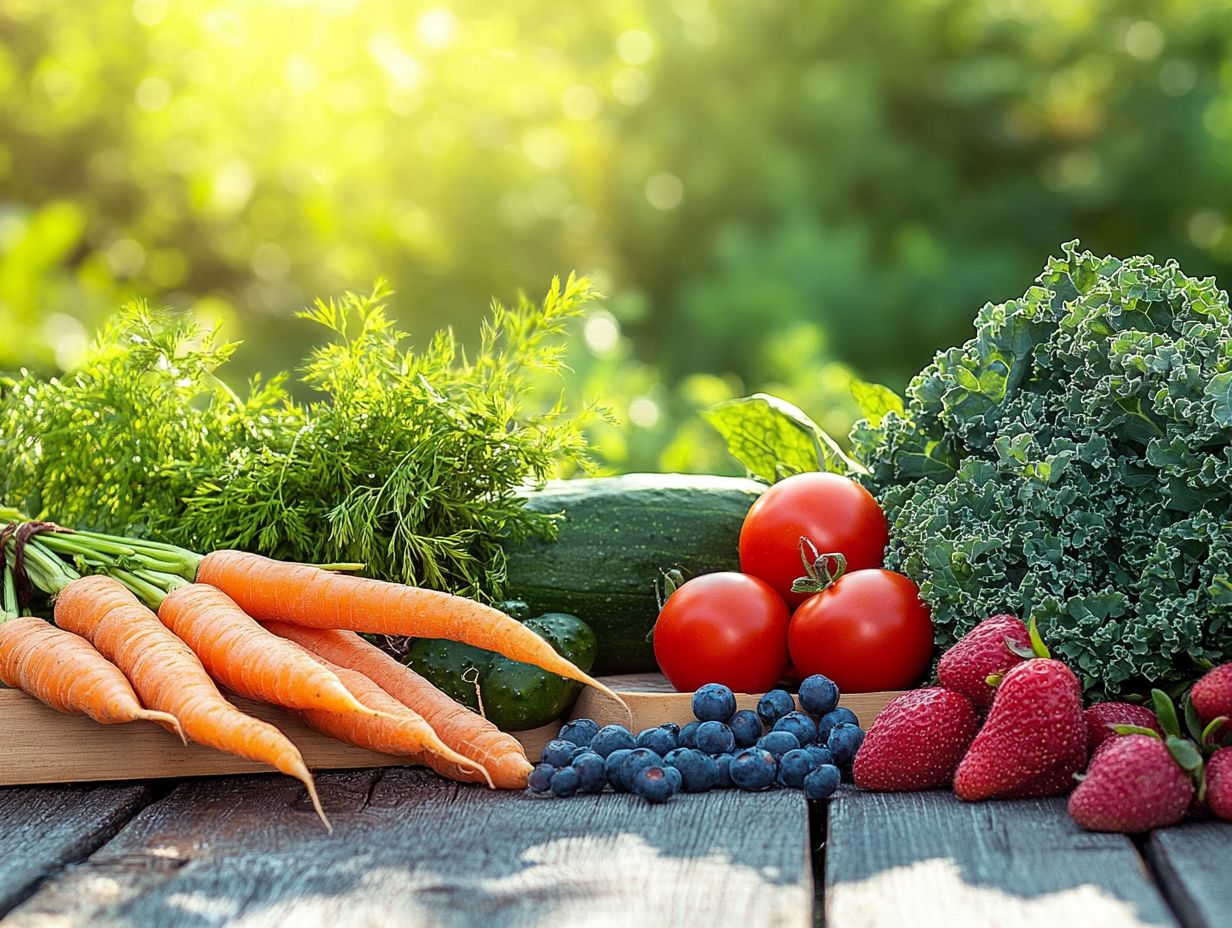
Yes, you can still eat your favorite foods, but it’s best to consume them in moderation. Out-of-season fruits and vegetables may be imported and might not be as fresh, flavorful, or nutritious as their in-season counterparts.
How can I incorporate seasonal foods into my diet?
You can incorporate seasonal foods into your diet by planning meals around them, trying new recipes, and experimenting with different cooking methods. Discovering the benefits of eating seasonal superfoods can also enhance your meals. Additionally, you can freeze or preserve seasonal produce to enjoy throughout the year.
Start your seasonal cooking journey today!
Are there any health benefits to consuming seasonal foods?
Yes, seasonal foods come with many health perks. They usually pack more nutrients, have fewer chemicals, and taste better than off-season options.
These foods also help your body get rid of toxins and boost your overall well-being.
Delicious Seasonal Treats to Savor Year-Round!
In spring, enjoy fresh asparagus, peas, and strawberries.
Summer brings juicy watermelon, sweet corn, and ripe tomatoes.
Fall offers crisp apples, delightful pumpkin, and hearty sweet potatoes.
Winter is the time for Brussels sprouts, zesty citrus fruits, and tasty winter squash.
Start your journey to better health by choosing seasonal foods today!


